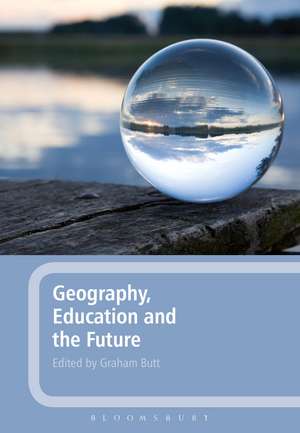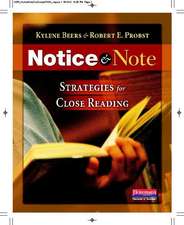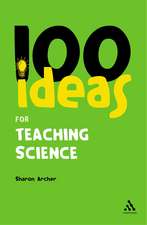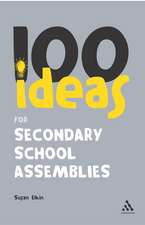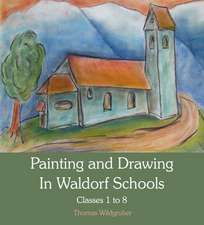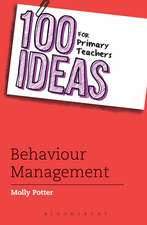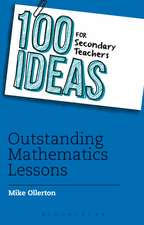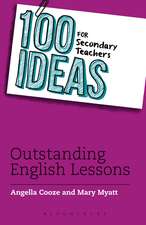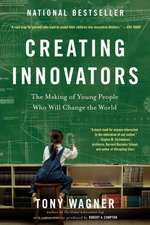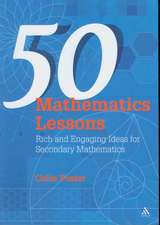Geography, Education and the Future
Editat de Dr Graham Butten Limba Engleză Paperback – 12 ian 2011
| Toate formatele și edițiile | Preț | Express |
|---|---|---|
| Paperback (1) | 372.65 lei 6-8 săpt. | |
| Bloomsbury Publishing – 12 ian 2011 | 372.65 lei 6-8 săpt. | |
| Hardback (1) | 1067.45 lei 6-8 săpt. | |
| Bloomsbury Publishing – 12 ian 2011 | 1067.45 lei 6-8 săpt. |
Preț: 372.65 lei
Preț vechi: 460.23 lei
-19% Nou
Puncte Express: 559
Preț estimativ în valută:
71.31€ • 74.30$ • 59.04£
71.31€ • 74.30$ • 59.04£
Carte tipărită la comandă
Livrare economică 03-17 aprilie
Preluare comenzi: 021 569.72.76
Specificații
ISBN-13: 9781847064981
ISBN-10: 1847064981
Pagini: 288
Dimensiuni: 155 x 231 x 10 mm
Greutate: 0.27 kg
Editura: Bloomsbury Publishing
Colecția Continuum
Locul publicării:London, United Kingdom
ISBN-10: 1847064981
Pagini: 288
Dimensiuni: 155 x 231 x 10 mm
Greutate: 0.27 kg
Editura: Bloomsbury Publishing
Colecția Continuum
Locul publicării:London, United Kingdom
Caracteristici
Considers â?~real worldâ?T geography issues within the context of a â?~futures perspectiveâ?T on geography education.
Notă biografică
Graham Butt is Reader in Geography Education, Director of Academic Planning and Deputy Head of the School of Education at the University of Birmingham, UK.
Cuprins
Notes on Contributors \ Introduction Graham Butt \ Part 1: Children, Young People and Geography Mary Biddulph \ 1.Children's Geographies in the Primary School Simon Catling \ 2. Young People's Conceptions of Geography and Education Nick Hopwood \ 3. Young People's Geographies: Implications for Secondary School Geography Mary Biddulph \ Discussion Pat Thompson \ Part II: Place, Space and Change John Morgan \ 4. Reading and Writing Place: A Role for Geographical Education in the 21st Century? Eleanor Rawling \ 5. Place-Based Education versus Geography Education? Alun Morgan \ 6. After the Crisis...Place, Space and Identity John Morgan \ Discussion Charles Rawding \ Part III: Mediating Forms of Geographical Knowledge Roger Firth \ 7. Reframing School Geography: A Capability Approach David Lambert \ 8. Debates about Knowledge and the Curriculum: Some Implications for Geography Education Roger Firth \ 9. Geographical Knowledge and Professional Development Clare Brooks \ Discussion Michael Young \ Part IV: Global Ethics, Environment and Citizenship Fran Martin \ 10. Morality and Geography Education Alun Morgan \ 11. Global Ethics, Sustainability and Partnership Fran Martin \ 12. Teaching Ethical Citizens? A Geographical Approach Jessica Pykett \ Discussion Clive Barnett \ Conclusion Margaret Roberts \ Index
Recenzii
'A detailed discussion of the challenges that geography as a subject faces both now and in the future. It encourages geography teachers to assess the relevance of the geography that they currently teach and consider which aspects of geography really matter.'Ellen Clarkson, Geography Teacher, George Salter Collegiate Academy, West Bromwich, UK
'This is an impressive publication from authors working at the leading edge of geography education research in England today. Each chapter captures original and innovative thinking and practice in school geography. Coverage is comprehensive, with sections focusing on student participation in geography curriculum-making; the cultural politics of space and place; issues around geographical knowledge and the ethico-political responsibilities of geography educators. A scholarly engagement with current and controversial issues in geography education is conveyed in a clear, refreshing style. This excellent publication will have appeal across a wide national and international audience of readers interested in the revitalisation of the school geography curriculum.'Christine Winter, Senior Lecturer, Department of Educational Studies, University of Sheffield, UK
'This set of topical and engaging essays moves forward the discipline of geography education. Each author draws on an impressive range of literature, contextualising their chosen focus within a range of academic fields. Discussants draw together shared threads within sections and suggest questions or implications raised by the material. This creates a coherent and lively experience for the reader, akin to being present at a seminar series. Geography, Education and the Future will be valuable to those working within geography education nationally and internationally.'Liz Taylor, Lecturer in Geography Education and Secondary PGCE Course Manager, Faculty of Education, University of Cambridge, UK
'Each chapter builds a compelling case for the role for the discipline, its perspectives, content and skills in elementary and secondary school as well as in adult life. The contributors place geography and 21st century subject based expectations on the same educational stage, making practical connections among ethics, citizenship, and geographic content at the elementary and secondary levels of schooling.' Joseph P. Stoltman, Professor of Geography and Science Education, Western Michigan University, USA
'This is a book edited and written by those who are at the forefront of geographical education in the twenty-first century. While it acknowledges the need to revitalise geography in schools, it does not shy away from the difficulties of such an aim. Its intellectual compass is wide, from considering the components of geographical education to epistemological questions, curriculum theory, and ethical and pedagogical issues. Its emphasis on the worthwhile ideas of geography, as Michael Young points out, is more limited. It is a book which will appeal to those who wish to examine critically their thinking about and practice of geographical education.' Norman Graves, Curriculum Journal
This book should be required reading for all geography teachers who wish to adapt their curriculum to make their subject relevant to the citizens of the 21st century.
'This is an impressive publication from authors working at the leading edge of geography education research in England today. Each chapter captures original and innovative thinking and practice in school geography. Coverage is comprehensive, with sections focusing on student participation in geography curriculum-making; the cultural politics of space and place; issues around geographical knowledge and the ethico-political responsibilities of geography educators. A scholarly engagement with current and controversial issues in geography education is conveyed in a clear, refreshing style. This excellent publication will have appeal across a wide national and international audience of readers interested in the revitalisation of the school geography curriculum.'Christine Winter, Senior Lecturer, Department of Educational Studies, University of Sheffield, UK
'This set of topical and engaging essays moves forward the discipline of geography education. Each author draws on an impressive range of literature, contextualising their chosen focus within a range of academic fields. Discussants draw together shared threads within sections and suggest questions or implications raised by the material. This creates a coherent and lively experience for the reader, akin to being present at a seminar series. Geography, Education and the Future will be valuable to those working within geography education nationally and internationally.'Liz Taylor, Lecturer in Geography Education and Secondary PGCE Course Manager, Faculty of Education, University of Cambridge, UK
'Each chapter builds a compelling case for the role for the discipline, its perspectives, content and skills in elementary and secondary school as well as in adult life. The contributors place geography and 21st century subject based expectations on the same educational stage, making practical connections among ethics, citizenship, and geographic content at the elementary and secondary levels of schooling.' Joseph P. Stoltman, Professor of Geography and Science Education, Western Michigan University, USA
'This is a book edited and written by those who are at the forefront of geographical education in the twenty-first century. While it acknowledges the need to revitalise geography in schools, it does not shy away from the difficulties of such an aim. Its intellectual compass is wide, from considering the components of geographical education to epistemological questions, curriculum theory, and ethical and pedagogical issues. Its emphasis on the worthwhile ideas of geography, as Michael Young points out, is more limited. It is a book which will appeal to those who wish to examine critically their thinking about and practice of geographical education.' Norman Graves, Curriculum Journal
This book should be required reading for all geography teachers who wish to adapt their curriculum to make their subject relevant to the citizens of the 21st century.
